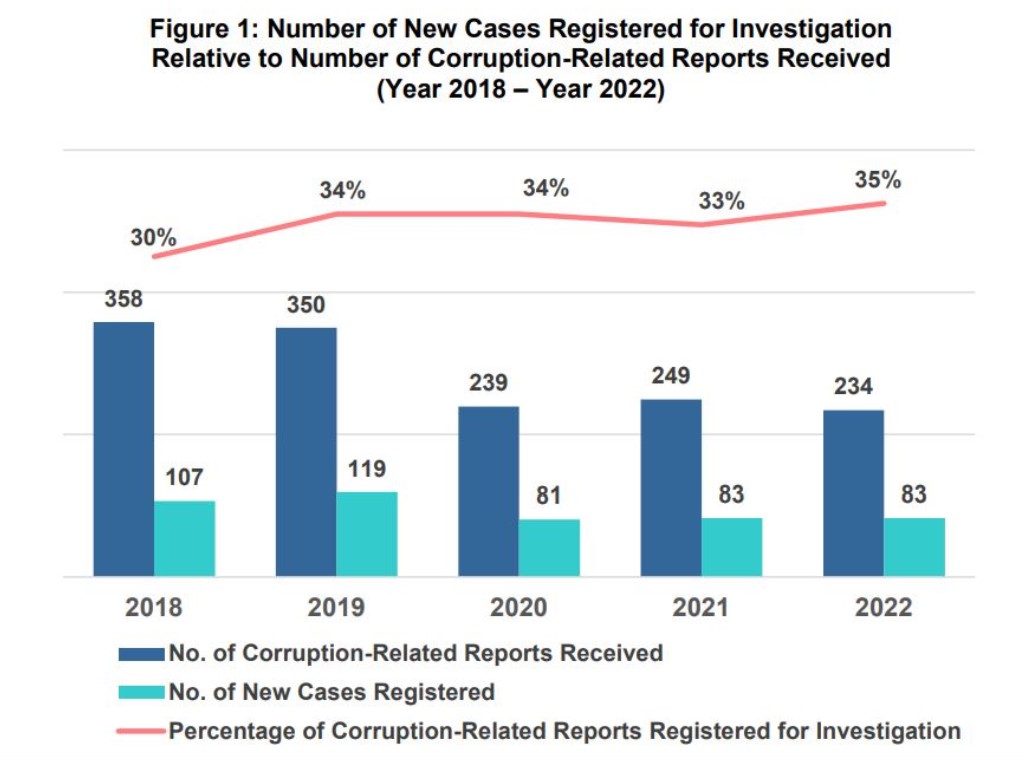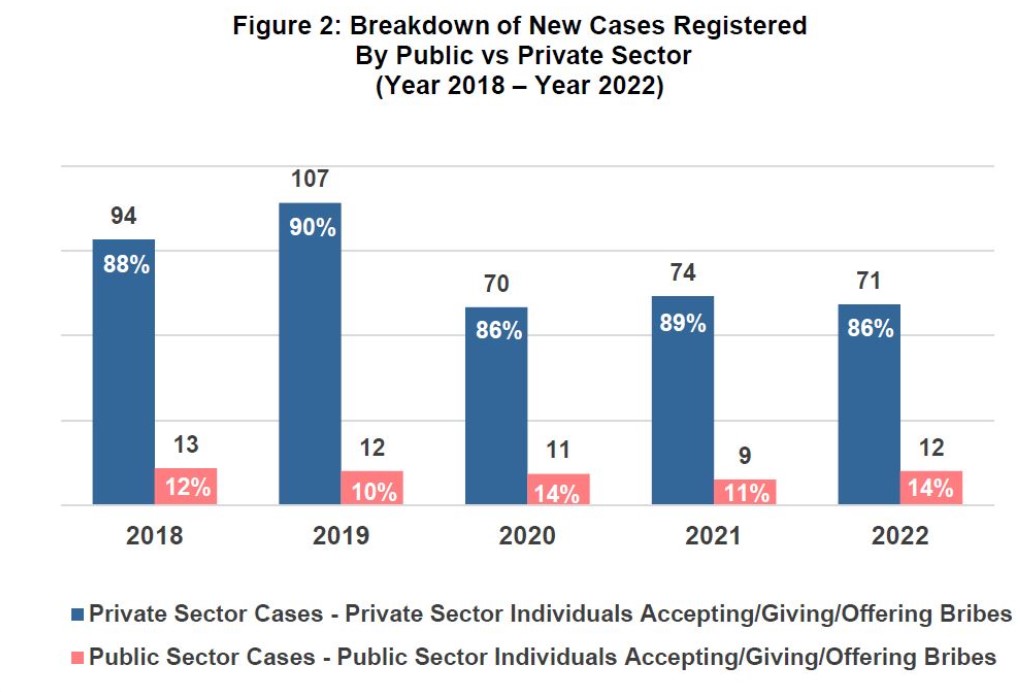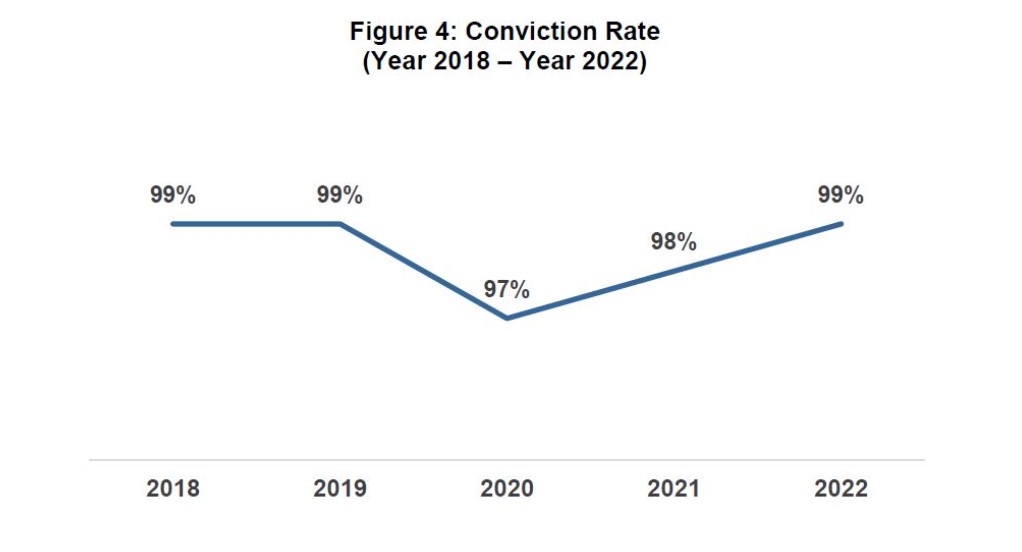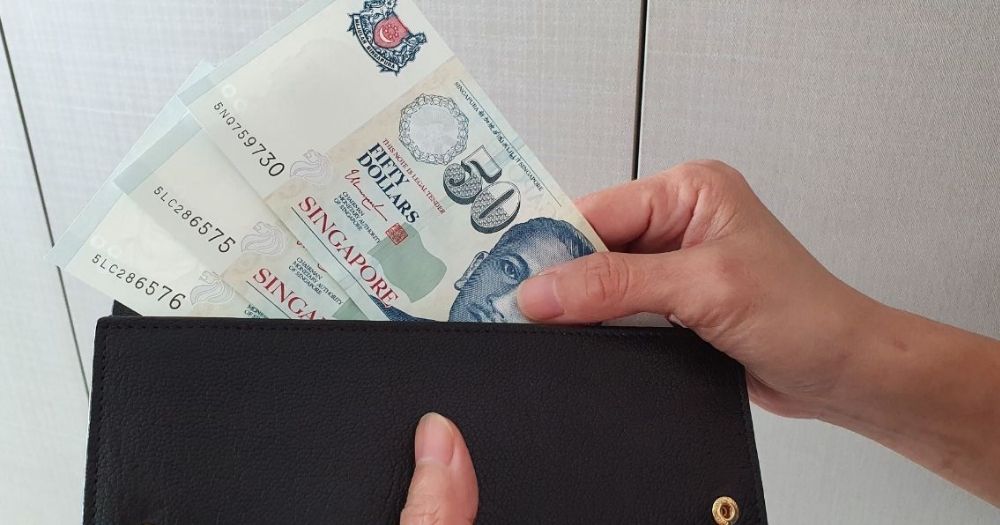The number of corruption-related reports received by the Corrupt Practices Investigation Bureau (CPIB), as well as the number of cases registered for investigation, has remained low.
According to the CPIB in a press release, it received 234 corruption-related reports in 2022, a 6 per cent decrease from the 249 corruption-related reports received in 2021.
Of these 234 reports, 83 were registered as new cases for investigation, which was the same number as 2021.
The bureau elaborated that these 83 cases also constituted 35 per cent of the total number of corruption-related reports received in 2022, a slight increase compared to the preceding four years.
 Source: Screenshot via CPIB
Source: Screenshot via CPIB
CPIB added, "The corruption situation in Singapore remains firmly under control."
Corruption reports are registered if the information can be pursued
The bureau further explained that for a corruption report to be registered for investigation, the information received must be pursuable.
This is determined by the quality of relevant information provided.
CPIB added that investigative enquiries and intelligence probes it had carried out also uncovered further information which enabled a higher percentage of reports to be registered for investigation.
The bureau also treats all reports received seriously regardless of whether the complainant is named or anonymous.
Of the 234 reports received in 2022, 100 (43 per cent) were anonymous.
As for the 83 new cases registered for investigation in 2022, 13 (16 per cent) were from anonymous sources.
Number of public sector corruption cases continue to remain low
As for the number of new corruption cases in the public sector, CPIB said 14 per cent or 12 of the 83 cases were from the public sector, while the remaining 86 per cent or 71 cases were from the private sector.
CPIB noted that the number of public sector cases registered remained low (12 cases), comparable to the annual average (11 cases) of the preceding four years.
 Source: Screenshot via CPIB
Source: Screenshot via CPIB
2022 also saw 152 individuals prosecuted in court for offences investigated by CPIB.
Of these, 97 per cent or 148 were private sector individuals, while the remaining four individuals were public sector employees.
With regard to the conviction rate for 2022, CPIB added that this was 99 per cent, a slight improvement from the preceding two years.
The bureau added:
"The consistently high conviction rate for CPIB cases is testament to the quality of the Bureau’s investigation to be able to stand up to scrutiny in Court, as well as the close working relationship between CPIB and the Attorney-General’s Chambers (AGC) in bringing corrupt offenders to task."
 Source: Screenshot via CPIB
Source: Screenshot via CPIB
Notable cases since 2020
CPIB also highlighted four notable cases of corruption in its press release since 2020.
Corruption by NTUC FairPrice employees over fish and entertainment expenses
In 2020, CPIB received information from a member of the public alleging that Lim Kian Kok, a senior team leader of NTUC FairPrice Co-operative at the material time, had been purchasing significantly more fish from Ngow Chun Siong, an employee with Fish Vision Agro-tech.
In return, Ngow would pay for Lim’s entertainment expenses.
CPIB’s investigations found that Lim and his subordinate, See Hock Lam, obtained gratification amounting to about S$523,000 from various fish suppliers between 2013 and 2020 in exchange for procuring more fish and seafood from these suppliers, including Fish Vision, on behalf of NTUC FairPrice.
The ill-gotten gains were split between Lim and See.
Both Lim and See pleaded guilty to their offences. Lim was sentenced to four years and five months’ jail, and ordered to pay a penalty of $289,843.10, while See was sentenced to three years and two months’ jail, and ordered to pay a penalty of S$261,500.
CPIB added that it subsequently introduced NTUC FairPrice to the Singapore Standard (SS) ISO37001 Anti-Bribery Management Systems and the PACT: A Practical Anti-Corruption Guide for Businesses in Singapore.
In addition, the FairPrice Group has come onboard CPIB’s Anti-Corruption Partnership Network.
HSA enforcement officers misappropriated vaping devices
In 2021, CPIB received an anonymous complaint alleging that a group of HSA enforcement officers were pilfering prohibited tobacco products that they were supposed to dispose of at Tuas Incineration Plant.
Acting on the complaint, the bureau mounted an operation named CandyCrush against Certis Cisco officers performing such duties.
Investigations revealed that at least 16 Certis Cisco officers had either misappropriated contraband cigarettes and vaping devices, or received these items from their colleagues who had misappropriated them in the course of their duties.
These contraband items were either seized in the course of their enforcement work, or taken from contraband items at Changi Airport that were meant to be sent to Tuas Incineration Plant for destruction.
Of these officers, six Certis Cisco enforcement officers attached to HSA were convicted and sentenced to imprisonment ranging from two weeks to three months.
CPIB shared the case-related details with HSA, Singapore Customs, and the Immigration & Checkpoints Authority (ICA) so that they could review their processes to prevent pilferage of contrabands.
Feedback was also provided by CPIB to the Police Licensing and Regulatory Department (PLRD).
Engineering firm gave bribes in the form of travel and entertainment expenses
2020 also saw CPIB received information from an anonymous source that the director of Starburst Engineering, Yap Tin Foo, was allegedly giving bribes in the form of entertainment and travel expenses to the vice president of Jurong Primewide, Tan Keng Liong, for the purpose of advancing the business interest of Starburst Engineering with Jurong Primewide.
Investigations revealed that Yap gave gratification in the form of entertainment and travel expenses of about S$14,700 to Tan in 2011.
Being a major player in the local ballistic industry, Starburst was involved in several government-related projects.
At the material period of offence, Starburst was a subcontractor of Jurong Primewide for the supply and installation of ballistic protection system under a Multi-Mission Range Complex (MMRC) project that had been awarded to Jurong Primewide by Defence Science & Technology Agency (DSTA).
Investigations also revealed that the director of Starburst, Edward Lim Chin Wah, had allegedly instigated an officer of Starburst to issue falsified subcontracts to the firm's subcontractor, G-Cube Engineering.
Yap then allegedly instigated an officer of G-Cube to generate false invoices based on the falsified subcontracts to Starburst to seek payment amounting to S$552,200 for works that were never carried out.
In addition, CPIB found confidential documents prepared by CPG Consultants for the Ministry of Home Affair’s Home Team Tactical Centre (HTTC) in Yap’s possession. Investigations showed that these documents were given to Yap by the vice president of CPG Consultants, Gerald Lim Lee Meng.
On Aug. 5, 2022, Yap and Edward Lim were charged in court for alleged corruption and falsification of accounts offences.
Their cases are currently before the court.
Tan and Gerald Lim were also charged and pleaded guilty to corruption offences and an offence under Official Secrets Act respectively.
Tan was sentenced in December 2022 to three months and two weeks’ imprisonment and ordered to pay a penalty of $14,699.62 for corruption.
Gerald Lim was sentenced in April 2023 to a fine of S$1,800 for breaching the Official Secrets Act.
NSF tried to use police ID for sexual services
In 2022, CPIB received information from the Singapore Police Force (SPF) alleging that a police full-time national serviceman deployed at Orchard Neighbourhood Police Centre, Fahd Siddiqui, had misused his warrant card while off-duty in his attempt to corruptly obtain sexual services from three social escorts.
This was in return for not taking enforcement action against them.
Prompt action by the SPF enabled CPIB to secure interviews with the social escorts involved, before they left Singapore.
It also allowed CPIB to quickly retrieve CCTV footages from two hotels before they were overwritten by new recordings.
Fahd was charged in Court on Nov. 24, 2022, for offences under the Prevention of Corruption Act and subsequently pleaded guilty to his offences. Fahd’s sentencing is still pending.
Public perception of CPIB is improving
According to a biennial Public Perception Survey commissioned by CPIB, public perception of national corruption control efforts has improved over the past three surveys.
CPIB engages an independent research company every two years to gauge public perception on corruption and the bureau.
The survey is conducted with approximately 1,000 individuals representative of the Singapore population profile.
In the 2022 survey, 96 per cent of respondents rated corruption control efforts in Singapore as good, very good or excellent, up from 94 per cent in 2020, 92 per cent in 2018, and 90 per cent in 2016.
Political determination to keep corruption under control, heavy punishment for corruption offences, and a zero-tolerance culture for corruption were cited as the top three most important factors contributing to the low corruption rate in Singapore.
Some 89 per cent of the survey respondents also felt that willingness of the public to report corruption was critical to the fight against corruption.
In stressing the importance of a "vigilant public", CPIB said it has continued to step up on its corruption prevention initiatives.
This includes, among other initiatives, the establishment of the Anti-Corruption Partnership Network (ACPN) by the bureau in 2018 to promote ownership of corruption prevention within the private sector.
In 2023, the ACPN membership was expanded to 70 entities to include selected auditing and consultancy firms, as well as more professional bodies and industry associations.
Top photo by Mothership
If you like what you read, follow us on Facebook, Instagram, Twitter and Telegram to get the latest updates.
